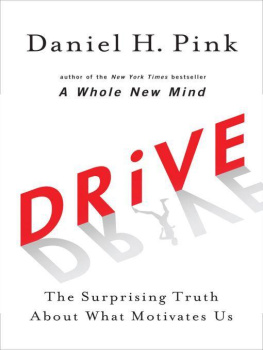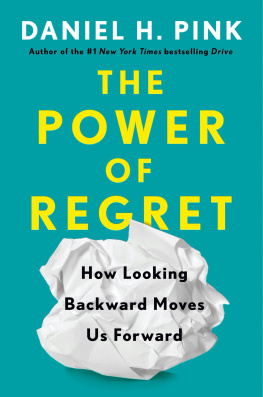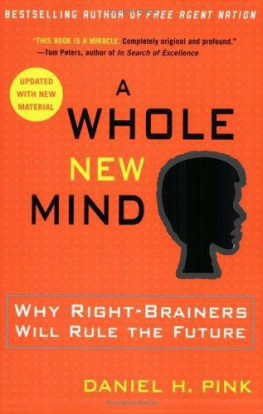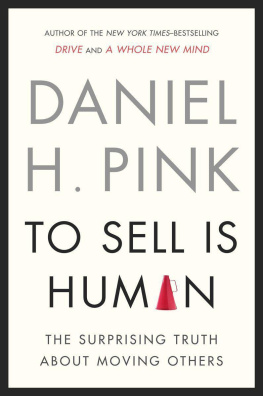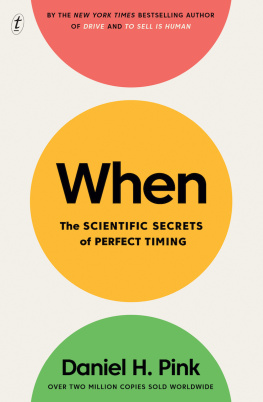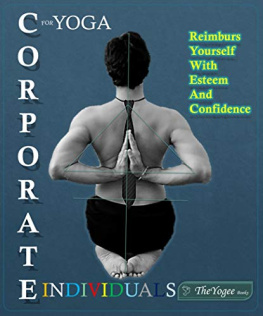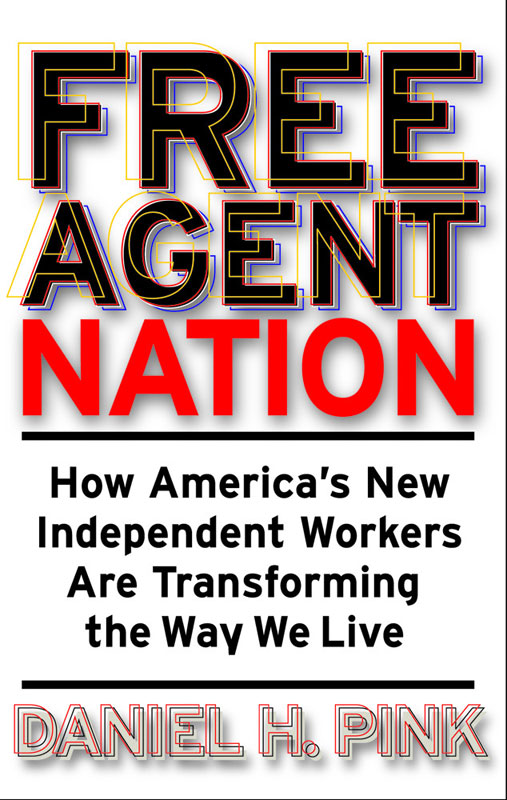FREE AGENT NATION. Copyright 2001 by Daniel H. Pink. All rights reserved. No part of this book may be reproduced in any form or by any electronic or mechanical means, including information storage and retrieval systems, without permission in writing from the publisher, except by a reviewer who may quote brief passages in a review.
Warner Books, Hachette Book Group, 237 Park Avenue, New York, NY 10017.
ISBN: 978-0-7595-2231-2
A hardcover edition of this book was published in 2001 by Warner Books.
First eBook Edition: April 2001
Visit our website at www.HachetteBookGroup.com.
For Jessica, of course
This book is a ground-level view of a revolution in how Americans work and live. It is the product of more than a year on the road and face-to-face interviews with several hundred independent workers. Except where noted in the text or endnotes, all quotations in the pages that follow (including the epigraphs that open each of the first thirteen chapters) come from interviews I conducted, and recorded on audiotape, during my journey through Free Agent Nation. In nearly all cases, I use peoples real names. In the few instances where, at the subjects request, I use a pseudonym or disguise the persons identity, I note that in the text.
Among the many things I learned in my travels was how time-starved most Americans feel. And among the many things Ive learned from reading nonfiction books is how little authors do to accommodate this reality of their readers lives. Thats why, at the end of every chapter of this book, Ive included what I call The Box. The Box contains the chapters key information and arguments. It consists of four small entries: The Crux, which summarizes the chapter in 150 words or less; The Factoid, one particularly revealing statistic from the chapter; The Quote, which pulls from the chapter one representative quotation; and The Word, a novel term or phrase from the new vocabulary of free agency. Read only The Box and youll miss the chapters narrative and nuancebut not, I hope, its point.
I suppose I realized that I ought to consider another line of work when I nearly puked on the Vice President of the United States.
It was a sweltering June day in Washington, D.C.the kind of day that drenches your shirt and sours your mood. I was completing my second year as then Vice President Al Gores chief speechwriter. And I was doing it hunched in front of my computer, banging on the keyboard, hoping that when my fingers stopped Id have produced another sentence, and that this new sentence would move me closer to completing one of two speeches that were due that afternoon.
Seated at nearby desks were two other, only slightly less beleaguered, speechwriters with whom I shared a large and mangy office. Even on this most oppressive of days, we wore the mandatory uniform for White House men: suit pants, a starched shirt, and a tie cinched to the Adams apple. Room 267 always smelled vaguely like a junior high locker room, but today was especially rank. As a climatological sauna baked the nations capital, here in our own miniseat of power, the air-conditioning had gone kaput. But away I typed, skittering ever nearer to finishing each speech, even as I melted into my cheap, gray chair.
At 5:45 that evening, I pulled both speeches from my printer, and scooted to the Vice Presidents West Wing office, about sixty paces down the hall from the Oval Office. At 6:00 P.M. the schedule called for speech prep, a peculiar meeting, wherein the Vice President reads your speech and explains what he likesor, more often, what he doesntas you sit there, mostly silent, absorbing the critique. This particular speech prep, however, was better than most. Gore was lighthearted and jokey (his office, let history record, had air-conditioning that day), and mostly satisfied with the texts. When the meeting began breaking up after about forty-five minutes, I lifted myself out of my chairand immediately felt nauseated and light-headed.
I walked out of the Vice Presidents office, shut his imposing mahogany door behind us, and lingered in his waiting room, where still more aides answered phones, screened visitors, and guarded the inner sanctum. Noticing that I was wobbly, one of my colleagues said, Dan, you look green.
Yeah, I responded. I dont feel so good.
The next thing I remember I was regaining consciousness, seated in a waiting room chair. And I was vomitingsteadily, calmly, like a seasoned pro. Not onto the plush vice presidential carpet fortunately, but into a ceremonial bowl that was a gift, I think, from the Queen of Denmark. (Ive since learned that under certain interpretations of international treaties, my regurgitation could be construed as an act of war against the Nordic nation.) I looked up and blinked away the haze to reveal the horrified faces of my colleagues, unaccustomed to such displays in the West Wing. My first thought: Oh no, this is how theyre going to remember me. After all the blood Ive sweated, the great lines Ive written, the indignities Ive endured, Im going to be known as the guy who upchucked in the Veeps office.
Before long, Gore emerged from behind his office door, surveyed the scene, squared his heels to look at me, and drawled, But Daaaaann. I said I liiiiiked the speech. Then after being assured by the ever-present Secret Service agent that I was a threat to neither his safety nor the U.S. Constitution, he returned to his office. A White House doctor arrived shortly thereafter. He spirited me to a West Wing examination room, checked my vitals, and issued the following diagnosis: exhaustion.
Three weeks later, on Independence Day, I left that job. Indeed, I left all jobs for good. I became a free agent.
I forged an office out of the attic of my Washington, D.C., home, and tried to parlay my skills and contacts into something resembling a living for my young family. I secured a contract with Fast Company magazine, and jumped on the phones to see if somebody would pay me for prose. Soon, they didand I began working for myself, writing speeches and articles for just about anybody whose check would clear.
Now, truth be told, this move from the White House to the Pink House was something Id been contemplating for a long time. My job had its charms at firsttrips aboard Air Force Two, meetings at the vice presidential mansion, chance encounters with Wolf Blitzer. But before long, the hypoxia of having reached the heights of my profession gave way to a dull sadness. I missed my wife. I missed our daughter. I missed my life. And perhaps strangely for someone normally in public service, I missed making a difference.
And I wasnt alone. At least thats what I sensed. Several of my friends and neighbors were making similar moves. They were abandoning traditional jobs to strike out on their own. Some, of course, were keen on building the next great company. But most were thinking smaller. Like me, they were tired and dissatisfied. They just wanted to be in charge of their lives.
Following this hunch, I asked my editors at Fast Company if I could look into this phenomenonand what I found astonished me. It wasnt simply that legions of people were declaring independencebecoming self-employed, independent contractors, and micropreneurs. It was why they were doing it, and how. I wrote a cover story for the magazine about these free agents, and within a day of publication my e-mail in box was bulging with messages, many of them downright gleeful. Each day, dozens of electronic epistles arrived thanking me for writing the article, and for identifying and legitimizing this new way to work.


